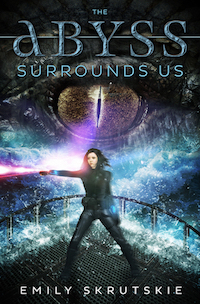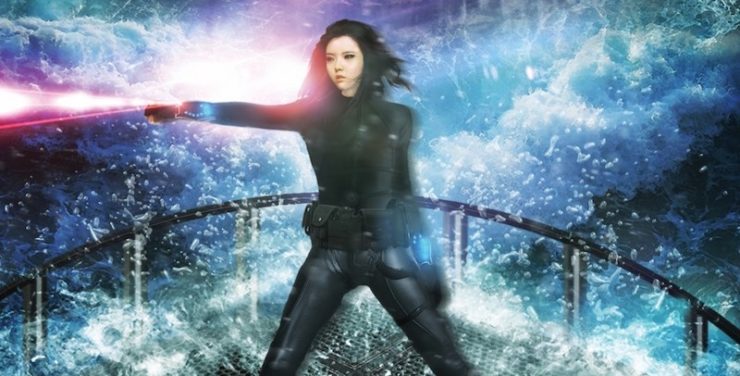I seem not to be reading really good books lately. But I also seem to be really enjoying a certain cracktastic flavour of book—I’m thinking of them as the equivalent of a B-movie, the book that’s either trying with all its heart to be more than pulp, or that embraces its pulpiness and basically revels in it.
I was introduced to Emily Skrutskie’s The Abyss Surrounds Us (Flux, 2016) with the words “pirates,” “sea monsters,” and “lesbians.” These are at least two of my favourite fictional things! I was sold. So very sold.
 I wanted to love this book. Maybe I wanted to love it too much.
I wanted to love this book. Maybe I wanted to love it too much.
Cas Leung is on her first solo assignment as a trainer of a Reckoner—sea monsters designed and breed to protect industrial shipping from pirates in a world that has changed significantly due to the effects of climate change—when pirates kill her charge and take her prisoner. Santa Elena, ruthless and bloodthirsty captain of the pirate ship Minnow, has acquired an infant Reckoner of her own. And she needs someone to train it to fight for her.
Cas is that someone. If she fails, she dies. And the junior pirate assigned as her guard and/or motivator, the girl Swift, will die with her.
The sea monsters are pretty great. I really liked the sea monsters. I mean, SEA MONSTERS. What’s not to like? The complicated, prickly relationship that develops between Cas and Swift—from not-exactly-friendship to friendship, and to something more—is also really great. And the imbalance of power that lies between them is explicitly acknowledged. That’s really good, and far rarer than is to be preferred.
Unfortunately, The Abyss Surrounds Us has a couple of downsides. The worldbuilding, for one: People train sea monsters to protect shipping, but their military potential against targets other than pirates has never been explored, nor does the narrative even acknowledge that they have non-pirate-related military potential? That’s a big logic gap. I don’t believe enough in the inherent niceness of humanity to find that very plausible.
The other problem is that with one notable possible exception, Cas is far more emotionally invested in sea monsters than in people. (Understandable: I mean, sea monsters.) But it makes her character, in moral terms, come across as fairly shallow. She ends up, for crying out loud, killing job lots of people because Captain Pirate Queen threatens to kill the girl she likes. I don’t find “slaughter many to save one or two” all that justifiable: The ethical centre of this novel ends up a wee bit skewed, and the antiheroics of the climax didn’t come across as all that well prefigured in the earlier narrative.
On the other hand. Sea monsters. Pirates. Pulpy goodness, until it falls apart.
 Also bringing the pulpy goodness—and the queer ladies: I might be on a queer lady kick even more than usual lately—is D. Jordan Redhawk’s Sanguire series, a quartet of novels published by Bella Books between 2012 and 2015 (The Strange Path, Beloved Lady Mistress, Inner Sanctuary, and Lady Dragon).
Also bringing the pulpy goodness—and the queer ladies: I might be on a queer lady kick even more than usual lately—is D. Jordan Redhawk’s Sanguire series, a quartet of novels published by Bella Books between 2012 and 2015 (The Strange Path, Beloved Lady Mistress, Inner Sanctuary, and Lady Dragon).
The prose is a little rough, and the pacing has a few issues. But this series… the easiest way to describe it, I think, is that it’s a coming-of-age story that involves Not!Vampires (blood-drinking immortal supernatural beings who walk about in daylight and call themselves “Sanguire”) and is more than a little reminiscent of The Princess Diaries—except with more reincarnation. And more murder. And probably more sex.
Homeless teenager Whiskey encounters some strange people and embarks on a peculiar ritual to awaken her vampire powers. (I’m just going to say “vampire,” because “Sanguire” makes me chuckle a little too much.) During the course of this ritual, she (and others) discover that she’s the prophesied reincarnation of an incredibly powerful (and pretty nasty) vampire queen who died about five centuries ago. Lots of other vampires either want her dead or under their control, and even the handful of old loyalists who want to protect her have their own ideas about what Whiskey should be doing.
Also, her past-life self’s great love is still alive, still in love with who Whiskey used to be five hundred years ago, and incredibly rich. But Whiskey isn’t the same person as that medieval vampire queen. For one thing, she’s not an absolute dictator who tortures and kills anyone who annoys her—and she has no desire to be.
I don’t understand why I enjoyed this series so much, but I can’t deny that I really enjoyed it: it’s far more entertaining that it has any right to be.
Liz Bourke is a cranky person who reads books. She holds a Ph.D in Classics from Trinity College, Dublin. Find her at her blog. Or her Twitter.










